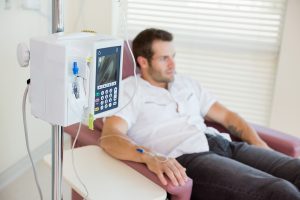Immune support for cancer patients is necessary when their platelets are decreasing from chemotherapy. Dr. John L. Hall gave a talk at the 25th Annual World Congress on Anti-Aging Medicine in Las Vegas, Dec. 14-16, 2017. He pointed out that when cancer patients receive chemotherapy their platelet counts in the blood decline. Dr. Hall participated in a 2010 study that investigated the use of RNA fragments to protect stem cells in the bone marrow from chemotherapy. The study showed how fragments coming from E.coli protected patients’ bone marrow cells. This immune support for cancer patients allowed physicians to carry on with regular dosing of chemotherapy treatments for the patients’ cancer. There was no dosage reduction necessary and no interruption of the treatment schedule. The optimal dose was 80mg sublingually of RNA derived from E. coli, and patients self-administered the dosage every other day.
Low platelets mean bleeding
Normally patients would bleed or bruise easily when they received chemotherapy without protection by RNA fragments. There would be frequent nosebleeds, bleeding in the gums or in the mouth. Patients would also have blood in urine and get petechia on their skin.
Consequences of low platelet count on cancer patients
There are several consequences for cancer patients, when their platelets are low with chemotherapy.
- Patients with low platelets have fatigue
- They experience limitations with regard to physical function
- When platelets are low, patients need platelet perfusions
- There is compromise of their cancer treatment because chemotherapy needs adjustment of or the dosage, or the therapist needs to postpone further treatment.
- Their survival rates are lower due to cancellation of chemotherapy treatments
- More medical resources are necessary because of platelet transfusions
How do RNA fragments work?
RNA fragments act as primers triggering DNA synthesis in bone marrow stem cells. Fragmented RNA is also protective of bone marrow cells when the patient receives chemotherapy. In animal experiments, where toxic chemotherapy was given, fragmented RNA allowed these animals to survive. This prompted oncologists to introduce this treatment modality into end stage cancer patients who are receiving chemotherapy. Results were stunning. The patients from age 18 to 80 tolerated the RNA fragments well. They were able under the influence of the RNA fragments to continue with their regular chemotherapy to completion of the therapeutic course. When laboratory tests measured platelets, the results were normal. The investigators concluded that the RNA fragments protected the bone marrow stem cells of platelets.
The tumors in this trial involved pancreatic cancer, head and neck cancer and cancer of the breast. In addition physicians also treated colon cancer, esophageal cancer and lung cancer .
More details about RNA fragment therapy in cancer patients requiring chemotherapy
Cancer patients who had no protection by RNA fragments had platelet levels that became lower and lower with every chemotherapy treatment cycle. Some patients never returned to normal platelet levels even once the chemotherapy stopped. Other cancer patients’ platelets took month before they returned to normal. Patients in this group either needed to either reduce their chemotherapy dosage or put treatments on hold. Alternatively their treatment stopped prematurely.
In contrast patients whose bone marrow received protection by RNA fragment therapy had stable platelet levels. Their platelet levels recovered quickly to normal after each cycle of chemotherapy. No unplanned chemotherapy reduction was necessary and no platelet transfusions were required. All the patients were able to complete the treatment plan.
The physicians also observed that with RNA fragment therapy the peak platelet counts were still in the normal range despite chemotherapy. When patients recovered from the chemotherapy effect the platelets stayed in the normal range.
Insulin potentiation therapy
Research has shown that cancer cells have more insulin receptors than normal cells. Physicians used this fact with a form of chemotherapy where the patient receives small doses of insulin first. Following that the patient can receive lower doses of chemotherapy. Dr. Donato Perez Garcia MD is the inventor of the insulin potentiation therapy (IPT). With this treatment the patient can receive lower than normal chemotherapeutic agents , which reduces the toxic side effects of chemotherapy. Unfortunately the side effect of the lower dose of chemotherapy still hits the bone marrow. As a result the platelets are dangerously low. Dr. Hall mentioned that RNA fragments are also effective with insulin potentiation therapy. This keeps the platelets in the normal range and patients can complete the course of insulin potentiation therapy.
More background about the insulin potentiation therapy
Dr. Robert Baratz has reviewed the merits of IPT thoroughly. He came to the conclusion that the so-called research about the effectiveness regarding IPT has not been done properly. In his opinion it is not proven that less chemotherapy is required when pretreatment with insulin has been done. There are also dangers that connect with insulin therapy. If the insulin dosage is too high blood sugar will go into dangerously low levels. The FDA has never accepted that the IPT procedure would be superior to standard chemotherapy. However, regardless of the chemotherapy dosage these chemicals are bone marrow toxic. Particularly the toxic effect on stem cells of platelets will cause diminished platelet counts in the blood with both procedures. In both cases RNA fragment therapy will overcome the toxic effect on the bone marrow stem cells.
Conclusion
Bone marrow suppression by chemotherapy has been a limiting factor for many years prior to the detection of RNA fragment therapy (RFT). RNA for RFT is derived from E. coli cultures. RNA fragments act as primers triggering DNA synthesis in bone marrow stem cells. This leads to the production of platelets that protect the patients from the toxic effects of chemotherapy on bone marrow. RFT allows the patient to receive treatment with chemotherapy without having to worry about bone marrow toxicity. No chemotherapy dose reduction is necessary and no platelet transfusions are needed. RFT should be a regular accompaniment to chemotherapy treatments for any cancer patient.






